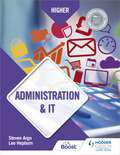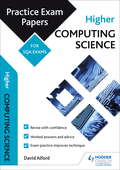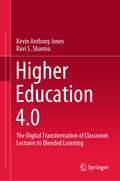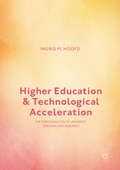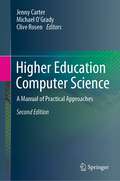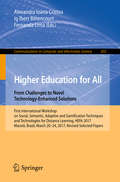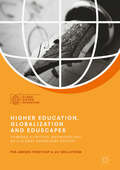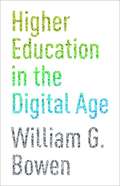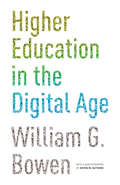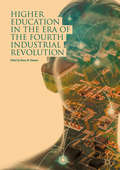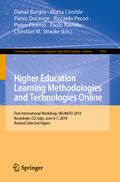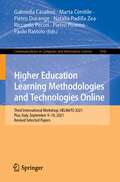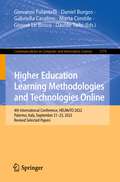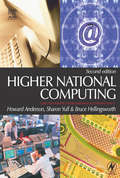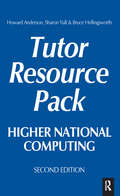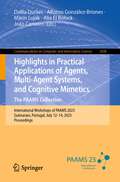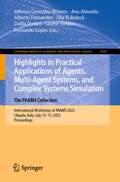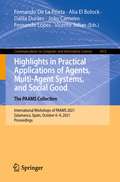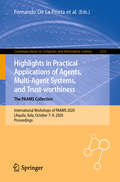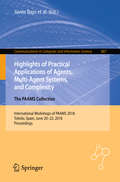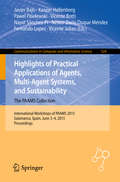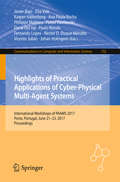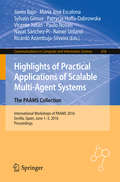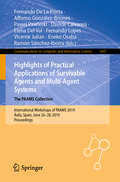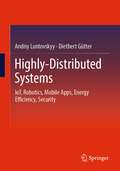- Table View
- List View
Higher Administration & IT
by Steven Argo Lee HepburnTrust our authors - whose students have achieved 100% A-C grades in Higher Admin since 2018 - to build your confidence and boost your grade.Easy to understand and enjoyable to read, this textbook takes you through all the theoretical content and practical skills, with over 60 accompanying digital tasks provided free online.> Learn and remember every topic. Simple explanations ensure that you have strong knowledge of administrative theory. Real-life case studies with differentiated exam-style questions help to check understanding before you move on.> Gain skills for the future. Digital literacy, organisational and management skills are developed throughout the course. The authors also focus on problem-solving skills, to set you up for success in the workplace.> Put skills into practice. Follow clear, step-by-step guides to using spreadsheets, databases, word processing, presentations, emails and e-diary. Apply your skills to over 60 digital tasks, which are available free online.> Prepare for assessment. 'What you should know' checklists and study activities at the end of each chapter are useful revision tools. A practice exam paper and answers are included in the book, and a practice assignment is provided online, with a full marking scheme.
Higher Computing Science: HCOMPPEP
by David AlfordPractise for your SQA exams with three specially-commissioned Hodder Gibson Practice Exam Papers.- Practise with model papers written and checked by experienced markers and examiners- Get extra advice with specially-written study-skills guidance sections- Gain vital extra marks and avoid common mistakes with examiner tips
Higher Education 4.0: The Digital Transformation of Classroom Lectures to Blended Learning
by Kevin Anthony Jones Sharma RavishankarThis book chronicles a 10-year introduction of blended learning into the delivery at a leading technological university, with a longstanding tradition of technology-enabled teaching and learning, and state-of-the-art infrastructure. Hence, both teachers and students were familiar with the idea of online courses. Despite this, the longitudinal experiment did not proceed as expected. Though few technical problems, it required behavioural changes from teachers and learners, thus unearthing a host of socio-technical issues, challenges, and conundrums. With the undercurrent of design ideals such as “tech for good”, any industrial sector must examine whether digital platforms are credible substitutes or at best complementary. In this era of Industry 4.0, higher education, like any other industry, should not be about the creative destruction of what we value in universities, but their digital transformation. The book concludes with an agenda for large, repeatable Randomised Controlled Trials (RCTs) to validate digital platforms that could fulfil the aspirations of the key stakeholder groups – students, faculty, and regulators as well as delving into the role of Massive Open Online Courses (MOOCs) as surrogates for “fees-free” higher education and whether the design of such a HiEd 4.0 platform is even a credible proposition. Specifically, the book examines the data-driven evidence within a design-based research methodology to present outcomes of two alternative instructional designs evaluated – traditional lecturing and blended learning. Based on the research findings and statistical analysis, it concludes that the inexorable shift to online delivery of education must be guided by informed educational management and innovation.
Higher Education and Technological Acceleration: The Disintegration of University Teaching and Research
by Ingrid M. HoofdThis book critically examines the relationship between new media technologies, research ethics, and pedagogical strategies within the contemporary university. It debates whether recent transformations of higher education, rather than an effect of neo-liberalization, are actually an outflow of the technological acceleration of the university's own contradictory ideals around knowledge and democracy. The book sets up this argument by likening the university to a "vision machine" which quest for total scientific and social transparency has recently caved in on itself, negatively affecting staff and student well-being. The book asserts that this situation reveals the essential tension at the heart of the university system, and explores the acceleration of this tension by analyzing a variety of teaching and research advances from Europe and Asia. Examining among other issues the call for creativity and critical thinking in the curriculum, the push for e-learning, and the advent of the digital humanities, this text offers a key analysis of the university's founding ideals and its constitutive relationship to technological acceleration.
Higher Education Computer Science: A Manual of Practical Approaches
by Jenny Carter Michael O’Grady Clive RosenThe march towards on-line and blended teaching—present before the Covid-19 pandemic—has been accelerated by it, and there is no going back. Students and staff may object, but the economic drive towards “greater productivity” will inevitably result in less face-to-face (f2f) instruction. Therefore, it is incumbent for those delivering this precious, in-person resource to make maximum use of time…which raises the question, “how”?The second edition of Higher Education Computer Science offers some potential answers. It also addresses other questions, such as “why have f2f teaching at all?” “what is the purpose of f2f?” and “what is the appropriate balance between the two?” The first edition began to offer suggestions for optimising limited opportunities to get together with students. Aligned with that, this unique new volume examines how to use the technology available to maximum advantage: For example, resources such as Moocs and other on-line instructional materials can provide invaluable pedagogic support. In addition, the book addresses ‘problem-based learning,’ using robotics in the teaching of programming, and a multidisciplinary approach to data science. Although it includes a chapter on distance learning, there is greater emphasis placed on the soft, transferable skills and employability skills that are best delivered in person. Further, the work provides several examples of putting theory into practice when teaching computer science at both undergraduate and postgraduate levels. Written by experienced practitioners, each chapter tackles a particular teaching activity or topic within computing, presented in such a way that other practitioners can use. As such, this new volume will be an invaluable resource to those who want to protect and optimise in-person teaching.
Higher Education for All. From Challenges to Novel Technology-Enhanced Solutions: First International Workshop On Social, Semantic, Adaptive And Gamification Techniques And Technologies For Distance Learning, Hefa 2017, Maceió, Brazil, March 20-24, 2017, Revised Selected Papers (Communications In Computer And Information Science #832)
by Alexandra Ioana Cristea Ig Ibert Bittencourt Fernanda LimaThis book constitutes the thoroughly refereed proceedings of the Researcher Links Workshop: Higher Education for All, held in Maceió, Brazil, in March 2017. The 12 full papers presented were carefully reviewed and selected from 31 submissions. The papers deal with a large spectrum of topics, including higher education, technology-enhanced solutions, user modelling, user grouping, gamification, educational games, MOOCs, e-learning, open educational resources, collaborative learning, student modelling, serious games, language analysis.
Higher Education, Globalization and Eduscapes: Towards A Critical Anthropology Of A Global Knowledge Society (Palgrave Studies in Global Higher Education)
by Per-Anders Forstorp Ulf MellströmThis book examines transnational scapes and flows of higher education: arguing that the educational and political vision of a national, regional and global knowledge society needs to be perspectivized beyond its ethnocentric conditions and meanings. Using eduscapes as its most important concept, this book explores the educational landscapes of individual as well as institutional actors; particularly the agential aspects of how global eduscapes are imagined, experienced, negotiated and constructed. In addition, the authors highlight the critical potential of anthropology, using this perspective as a resource for cultural critique where the Western experience and assumed ‘ownership’ of the global knowledge economy will be put into question. This comprehensive book will appeal to students and scholars of educational policy, the sociology of education and the globalization of education.
Higher Education in the Digital Age
by William G. BowenTwo of the most visible and important trends in higher education today are its exploding costs and the rapid expansion of online learning. Could the growth in online courses slow the rising cost of college and help solve the crisis of affordability? In this short and incisive book, William G. Bowen, one of the foremost experts on the intersection of education and economics, explains why, despite his earlier skepticism, he now believes technology has the potential to help rein in costs without negatively affecting student learning. As a former president of Princeton University, an economist, and author of many books on education, including the acclaimed bestseller The Shape of the River, Bowen speaks with unique expertise on the subject.Surveying the dizzying array of new technology-based teaching and learning initiatives, including the highly publicized emergence of "massive open online courses" (MOOCs), Bowen argues that such technologies could transform traditional higher education--allowing it at last to curb rising costs by increasing productivity, while preserving quality and protecting core values. But the challenges, which are organizational and philosophical as much as technological, are daunting. They include providing hard evidence of whether online education is cost-effective in various settings, rethinking the governance and decision-making structures of higher education, and developing customizable technological platforms. Yet, Bowen remains optimistic that the potential payoff is great.Based on the 2012 Tanner Lectures on Human Values, delivered at Stanford University, the book includes responses from Stanford president John Hennessy, Harvard University psychologist Howard Gardner, Columbia University literature professor Andrew Delbanco, and Coursera cofounder Daphne Koller.
Higher Education in the Digital Age
by Kevin M. Guthrie William G. BowenTwo of the most visible and important trends in higher education today are its exploding costs and the rapid expansion of online learning. Could the growth in online courses slow the rising cost of college and help solve the crisis of affordability? In this short and incisive book, William G. Bowen, one of the foremost experts on the intersection of education and economics, explains why, despite his earlier skepticism, he now believes technology has the potential to help rein in costs without negatively affecting student learning. As a former president of Princeton University, an economist, and author of many books on education, including the acclaimed bestseller The Shape of the River, Bowen speaks with unique expertise on the subject. Surveying the dizzying array of new technology-based teaching and learning initiatives, including the highly publicized emergence of "massive open online courses" (MOOCs), Bowen argues that such technologies could transform traditional higher education--allowing it at last to curb rising costs by increasing productivity, while preserving quality and protecting core values. But the challenges, which are organizational and philosophical as much as technological, are daunting. They include providing hard evidence of whether online education is cost-effective in various settings, rethinking the governance and decision-making structures of higher education, and developing customizable technological platforms. Yet, Bowen remains optimistic that the potential payoff is great. Based on the 2012 Tanner Lectures on Human Values, delivered at Stanford University, the book includes responses from Stanford president John Hennessy, Harvard University psychologist Howard Gardner, Columbia University literature professor Andrew Delbanco, and Coursera cofounder Daphne Koller.
Higher Education in the Era of the Fourth Industrial Revolution
by Nancy W. GleasonThis open access collection examines how higher education responds to the demands of the automation economy and the fourth industrial revolution. Considering significant trends in how people are learning, coupled with the ways in which different higher education institutions and education stakeholders are implementing adaptations, it looks at new programs and technological advances that are changing how and why we teach and learn. The book addresses trends in liberal arts integration of STEM innovations, the changing role of libraries in the digital age, global trends in youth mobility, and the development of lifelong learning programs. This is coupled with case study assessments of the various ways China, Singapore, South Africa and Costa Rica are preparing their populations for significant shifts in labour market demands – shifts that are already underway. Offering examples of new frameworks in which collaboration between government, industry, and higher education institutions can prevent lagging behind in this fast changing environment, this book is a key read for anyone wanting to understand how the world should respond to the radical technological shifts underway on the frontline of higher education.
Higher Education Learning Methodologies and Technologies Online: First International Workshop, HELMeTO 2019, Novedrate, CO, Italy, June 6-7, 2019, Revised Selected Papers (Communications in Computer and Information Science #1091)
by Daniel Burgos Marta Cimitile Pietro Ducange Riccardo Pecori Pietro Picerno Paolo Raviolo Christian M. StrackeThis book constitutes the thoroughly refereed post-conference proceedings of the First International Workshop on Higher Education Learning Methodologies and Technologies Online, HELMeTO 2019, held in Novedrate, Italy, in June 2019. The 15 revised full papers and 2 short papers presented were carefully reviewed and selected from a total of 39 submissions. The papers are organized in topical sections on online pedagogy and learning methodologies; learning technologies, data analytics and educational big data mining as well as their applications; the challenge of online sport and exercise sciences university programs.
Higher Education Learning Methodologies and Technologies Online: Third International Workshop, HELMeTO 2021, Pisa, Italy, September 9–10, 2021, Revised Selected Papers (Communications in Computer and Information Science #1542)
by Gabriella Casalino Marta Cimitile Pietro Ducange Natalia Padilla Zea Riccardo Pecori Pietro Picerno Paolo RavioloThis book constitutes the thoroughly refereed post-conference proceedings of the Third International Workshop on Higher Education Learning Methodologies and Technologies Online, HELMeTO 2021, held in Pisa, Italy, in September 2021. Due to the COVID-19 pandemic the conference was held online. The 26 revised full papers and 3 short papers presented were carefully reviewed and selected from a total of 65 submissions. The papers present recent research on challenges of implementing emerging technology solution for online, online learning pedagogical frameworks, facing COVID19 emergency in higher education teaching and learning, online learning technologies in practice, online learning strategies and resources, etc.
Higher Education Learning Methodologies and Technologies Online: 4th International Conference, HELMeTO 2022, Palermo, Italy, September 21–23, 2022, Revised Selected Papers (Communications in Computer and Information Science #1779)
by Giovanni Fulantelli Daniel Burgos Gabriella Casalino Marta Cimitile Giosuè Lo Bosco Davide TaibiThis book constitutes the thoroughly refereed post-conference proceedings of the 4th International Conference on Higher Education Learning Methodologies and Technologies Online, HELMeTO 2022, held in Palermo, Italy, in September 2022. The 59 revised papers presented were carefully reviewed and selected from a total of 126 submissions. The papers present recent research on challenges of implementing emerging technology solution for online, online learning pedagogical frameworks, online learning technologies in practice, online learning strategies and resources, etc.
Higher National Computing
by Howard Anderson Sharon Yull Bruce HellingsworthHigher National Computing 2e is a new edition of this extremely successful course book, updated specifically to cover the compulsory core units of the 2003 BTEC Higher National Computing schemes. Full coverage is given of the four core units for HNC, the two additional core units required at HND, and the Core Specialist Unit 'Quality Systems', common to both certificate and diploma level.Students following the HNC and HND courses will find this book essential reading, as it covers the core material they will be following through the duration of their course. Knowledge-check questions and activities are included throughout, resulting in a clear and straightforward text which encourages independent study.Like the syllabus itself, this book is ideal for students progressing to HNC / HND from GNVQs, as well as A-Level and BTEC National, with content designed to cover the requirements of students following General Computing, Software Engineering and Business IT courses.
Higher National Computing Tutor Resource Pack
by Howard Anderson Sharon Yull Bruce HellingsworthUsed alongside the students' text, Higher National Computing 2nd edition, this pack offers a complete suite of lecturer resource material and photocopiable handouts for the compulsory core units of the new BTEC Higher Nationals in Computing and IT, including the four core units for HNC, the two additional core units required at HND, and the Core Specialist Unit 'Quality Systems', common to both certificate and diploma level.The authors provide all the resources needed by a busy lecturer, as well as a bank of student-centred practical work and revision material, which will enable students to gain the skills, knowledge and understanding they require.Also available as a web download for adopters, this pack will save a course team many hours' work preparing handouts and assignments, and is freely photocopiable within the purchasing institution. The pack includes:* Exercises to support and develop work in the accompanying student text* Planned projects which will enable students to display a wide range of skills and use their own initiative* Assessment materials* Reference material for use as hand-outs* Background on running the new HNC / HND courses* Tutor's notes supporting activities in the students' book and resource pack
Highlights in Practical Applications of Agents, Multi-Agent Systems, and Cognitive Mimetics. The PAAMS Collection: International Workshops of PAAMS 2023, Guimaraes, Portugal, July 12–14, 2023, Proceedings (Communications in Computer and Information Science #1838)
by Dalila Durães Alfonso González-Briones Marin Lujak Alia El Bolock João CarneiroThis book constitutes the refereed proceedings of the International Workshops on Highlights in Practical Applications of Agents, Multi-Agent Systems, and Cognitive Mimetics. The PAAMS Collection, PAAMS 2023, held in Guimaraes, Portugal, during July 12–14, 2023.The 14 full papers included in this book were carefully reviewed and selected from 26 submissions. They were organized in topical sections as follows: provides a unique opportunity to bring multi-disciplinary experts, academics, and practitioners together to exchange their experience in the development of agents and multi-agent systems.
Highlights in Practical Applications of Agents, Multi-Agent Systems, and Complex Systems Simulation. The PAAMS Collection: International Workshops of PAAMS 2022, L'Aquila, Italy, July 13–15, 2022, Proceedings (Communications in Computer and Information Science #1678)
by Alfonso González-Briones Ana Almeida Alberto Fernandez Alia El Bolock Dalila Durães Jaume Jordán Fernando LopesThis book constitutes the proceedings of the workshops co-located with the 20th International Conference on Practical Applications of Agents and Multi-Agent Systems, PAAMS 2022, held in L'Aquila, Italy, in July 2022.The total of 25 full papers presented in this volume were carefully reviewed and selected from 39 submissions.The papers in this volume stem from the following meetings: Workshop on Artificial Intelligence for Industry (AI4Industry); Workshop on Adaptive Smart areaS and Intelligent Agents (ASSIA); Workshop on Character Computing (C2); Workshop on Deep Learning Applications (DeLA); Workshop on Decision Support, Recommendation, and Persuasion in Artificial Intelligence (DeRePAI); Workshop on Multi-agent based Applications for Modern Energy Markets, Smart Grids and Future Power Systems (MASGES).
Highlights in Practical Applications of Agents, Multi-Agent Systems, and Social Good. The PAAMS Collection: International Workshops of PAAMS 2021, Salamanca, Spain, October 6–9, 2021, Proceedings (Communications in Computer and Information Science #1472)
by Vicente Julian Fernando Lopes Fernando De La Prieta Dalila Durães Alia El Bolock João CarneiroThis book constitutes the proceedings of the workshops co-located with the 19th International Conference on Practical Applications of Agents and Multi-Agent Systems, PAAMS 2021, held in Salamanca, Spain, in October 2021.The total of 17 full and 9 short papers presented in this volume were carefully selected from 42 submissions.The papers in this volume stem from the following meetings:Workshop on Character Computing (C2); Workshop on Deep Learning Applications (DeLA); Workshop on Decision Support, Recommendation, and Persuasion in Artificial Intelligence (DeRePAI); Workshop on Multi-agent based Applications for Modern Energy Markets, Smart Grids and Future Power Systems (MASGES); Workshop on Smart Cities and Intelligent Agents (SCIA).
Highlights in Practical Applications of Agents, Multi-Agent Systems, and Trust-worthiness. The PAAMS Collection: International Workshops of PAAMS 2020, L'Aquila, Italy, October 7–9, 2020, Proceedings (Communications in Computer and Information Science #1233)
by Fernando De La Prieta Philippe Mathieu Jaime Andrés Rincón Arango Alia El Bolock Elena Del Val Jaume Jordán Prunera João Carneiro Rubén Fuentes Fernando Lopes Vicente JulianThis book constitutes the refereed proceedings of the workshops co-located with the 18th International Conference on Practical Applications of Agents and Multi-Agent Systems, PAAMS 2020, held in L’Aquila, Italy, in October 2020. The total of 21 full and 13 short papers presented in this volume were carefully reviewed and selected from 57 submissions. The papers in this volume stem from the following meetings: Workshop on Agent-Based Artificial Markets Computational Economics (ABAM); Workshop on Agents and Edge-AI (AgEdAI); Workshop on Character Computing (C2); Workshop on MAS for Complex Networks and Social Computation (CNSC); Workshop on Decision Support, Recommendation, and Persuasion in Artificial Intelligence (DeRePAI); Workshop on Multi-Agent Systems and Simulation (MAS&S); Workshop on Multi-agent based Applications for Energy Markets, Smart Grids and Sustainable Energy Systems (MASGES); Workshop on Smart Cities and Intelligent Agents (SCIA).
Highlights of Practical Applications of Agents, Multi-Agent Systems, and Complexity: International Workshops of PAAMS 2018, Toledo, Spain, June 20–22, 2018, Proceedings (Communications in Computer and Information Science #887)
by Javier Bajo Juan M. Corchado Elena María Navarro Martínez Eneko Osaba Icedo Philippe Mathieu Patrycja Hoffa-Dąbrowska Elena Del Val Sylvain Giroux Antonio J. M. Castro Nayat Sánchez-Pi Vicente Julián Ricardo Azambuja Silveira Alberto Fernández Rainer Unland Rubén Fuentes-FernándezThis book constitutes the refereed proceedings of the 11 workshops co-located with the 16th International Conference on Practical Applications of Agents and Multi-Agent Systems, PAAMS 2018, held in Toledo, Spain, in June 2018. The 47 full papers presented were carefully reviewed and selected from 72 submissions. The volume presents the papers that have been accepted for the following workshops: Workshop on Agents and Multi-agent Systems for AAL and e-HEALTH; Workshop on Agent based Applications for Air Transport; Workshop on Agent-based Artificial Markets Computational Economics; Workshop on Agent-Based Solutions for Manufacturing and Supply Chain; Workshop on MAS for Complex Networks and Social Computation; Workshop on Intelligent Systems and Context Information Fusion; Workshop on Multi-agent based Applications for Energy Markets, Smart Grids and Sustainable Energy Systems; Workshop on Multiagent System based Learning Environments; Workshop on Smart Cities and Intelligent Agents; Workshop on Swarm Intelligence and Swarm Robotics; Workshop on Multi-Agent Systems and Simulation.
Highlights of Practical Applications of Agents, Multi-Agent Systems, and Sustainability - The PAAMS Collection
by Javier Bajo Kasper Hallenborg Pawel Pawlewski Vicente Botti Nayat Sánchez-Pi Nestor Darío Duque Méndez Fernando Lopes Vicente JulianThis book constitutes the refereed proceedings of the workshops which complemented the 13th International Conference on Practical Applications of Agents and Multi-Agent Systems, PAAMS 2015, held in Salamanca, Spain, in June 2015. The 36 revised full papers presented were carefully reviewed and selected from 91 submissions. This volume presents the papers that have been accepted for the following workshops: Workshop on Agents and multi-agent Systems for AAL and e-HEALTH, Workshop on Agent-Based Solutions for Manufacturing and Supply Chain, Workshop on MAS for Complex Networks and Social Computation, Workshop on Intelligent Systems for Context-based Information Fusion, Workshop on Multi-agent based Applications for Smart Grids and Sustainable Energy Systems, Workshop on Multiagent System based Learning Environments, Workshop in Intelligent Human-Agent Societies.
Highlights of Practical Applications of Cyber-Physical Multi-Agent Systems: International Workshops of PAAMS 2017, Porto, Portugal, June 21-23, 2017, Proceedings (Communications in Computer and Information Science #722)
by Javier Bajo, Zita Vale, Kasper Hallenborg, Ana Paula Rocha, Philippe Mathieu, Pawel Pawlewski, Elena Del Val, Paulo Novais, Fernando Lopes, Nestor D. Duque Méndez, Vicente Julián and Johan HolmgrenThis book constitutes the refereed proceedings of the nine workshops co-located with the 15th International Conference on Practical Applications of Agents and Multi-Agent Systems, PAAMS 2017, held in Porto, Portugal, in June 2017.The 41 full papers presented were carefully reviewed and selected from 80 submissions. The volume presents the papers that have been accepted for the following workshops: Workshop on Agent based Applications for Air Transport and Application of Agents to Passenger Transport; Workshop on Agent-based Artificial Markets Computational Economics; Workshop on Agents and Multi-agent Systems for AAL and e-HEALTH; Workshop on Agent-Based Solutions for Manufacturing and Supply Chain; Workshop on MAS for Complex Networks and Social Computation; Workshop on Decision Making in Dynamic Information Environments; Workshop on Multi-agent based Applications for Smart Grids and Sustainable Energy Systems; Workshop on Multiagent System based Learning Environments; Workshop on Smart Cities and Intelligent Agents.
Highlights of Practical Applications of Scalable Multi-Agent Systems. The PAAMS Collection
by Javier Bajo María José Escalona Sylvain Giroux Patrycja Hoffa-Dąbrowska Vicente Julián Paulo Novais Nayat Sánchez-Pi Rainer Unland Ricardo Azambuja-SilveiraThis book constitutes the refereed proceedings of the seven workshops co-located with the 14th International Conference on Practical Applications of Agents and Multi-Agent Systems, PAAMS 2016, held in Sevilla, Spain, in June 2016. The 37 full papers presented were carefully reviewed and selected from 77 submissions. The volume presents the papers that have been accepted for the following workshops: Workshop on Agents and Multi-Agent Systems for AAL and e-Health; Workshop on Agent-Based Solutions for Manufacturing and Supply Chain; Workshop on MAS for Complex Networks and Social Computation; Workshop on Decision Making in Dynamic Information Environments; Workshop on Intelligent Systems for Context-based Information Fusion; Workshop on Multi-Agent based Applications for Smart Grids and Sustainable Energy Systems; Workshop on Multiagent System based Learning Environments.
Highlights of Practical Applications of Survivable Agents and Multi-Agent Systems. The PAAMS Collection: International Workshops of PAAMS 2019, Ávila, Spain, June 26–28, 2019, Proceedings (Communications in Computer and Information Science #1047)
by Fernando De La Prieta Alfonso González-Briones Pawel Pawleski Davide Calvaresi Elena Del Val Fernando Lopes Vicente Julian Eneko Osaba Ramón Sánchez-IborraThis book constitutes the refereed proceedings of the workshops and special session co-located with the 17th International Conference on Practical Applications of Agents and Multi-Agent Systems, PAAMS 2019, held in Ávila, Spain, in June 2019.The total of 26 full and 8 short papers presented in this volume were carefully reviewed and selected from 47 submissions. The book also contains extended abstracts of the doctoral consortium contributions. The papers in this volume stem from the following meetings: Workshop on Agents-Based Solutions for Manufacturing and Supply Chain, AMSC; Second International Workshop on Blockchain Technology for Multi-Agent Systems, BTC4MAS; Workshop on MAS for Complex Networks and Social Computation; CNSC; Workshop on Multi-Agent Based Applications for Energy Markets, Smart Grids and Sustainable Energy Systems, MASGES; Workshop on Smart Cities and Intelligent Agents, SCIA; and Workshop on Swarm Intelligence and Swarm Robotics, SISR; as well as the special session on Software Agents and Virtualization for Internet of Things, SAVIoTS.
Highly-Distributed Systems: IoT, Robotics, Mobile Apps, Energy Efficiency , Security
by Andriy Luntovskyy Dietbert GütterSo, you are reading a book that aims to cover the field of recent innovations in network services and distributed systems. The book’s target audience includes university and technical college students, graduate engineers and teaching staff. If you are someone else, don’t worry, the topics covered may still be of interest to you!
